The Uncertain Future of Deep-Sea Mining: Global Debate at a Turning Point

Important Takeaways from the 30th Annual Session of the International Seabed Authority
The International Seabed Authority (ISA) stands at a critical, and worrying juncture. Under the United Nations Convention on the Law of the Sea (UNCLOS), the ISA's responsibility is to “organize, control, and regulate activities” in the deep ocean floor in international waters, those beyond any national jurisdiction. In its 30th Annual Session, hosted in Jamaica these last two weeks, it is clear that the ISA is navigating difficult mounting tensions between those pushing for a precautionary pause and others eager to commence commercial deep-sea mining.
The stakes could not be higher. During the session, the world got news that The Metals Company USA LLC (TMC USA) has begun a process with the U.S. National Oceanic and Atmospheric Administration (NOAA) to apply for a commercial deep-sea mining license under the 1980 U.S. Deep Seabed Hard Mineral Resources Act—a domestic law. The catch? The United States is not a party to UNCLOS, and therefore not subject to the ISA’s authority.
The move by TMC USA was met with widespread concern from ISA delegates.
The ISA’s Secretary-General Leticia Reis de Carvalho, emphasized that "any unilateral action would violate international law" and undermine the multilateral system built under UNCLOS. International waters, and the resources found in them, are considered a common heritage of humankind—a foundational tenet of international ocean governance that states that these resources belong to all of humanity. Estimates tell us that the rare-earth minerals in the deep sea, what TMC USA is after, range from a few billion to trillions of dollars in potential revenue generation. The world is after these minerals for the energy transition, as they are essential for batteries, electric vehicles, and other green technologies. However, mining them unilaterally and without a revenue-sharing framework to share the exploits with the rest of countries who also have the capacity to mine, or those countries who would be negatively affected by the mining, violates the principle of common benefit.
Secretary-General Carvalho pointed to the past three decades of ISA history, in which no state or entity has pursued claims outside the ISA system, as evidence of widespread international consensus that progress and exploitation in international areas should be done with consensus of the rest of the world- in international legal bodies. She reiterated that Article 137 of UNCLOS is unambiguous: no state or entity may claim sovereignty or ownership over any part of international waters, nor will any such claims be recognized by international law.
Furthermore, many nations recalled the 2023 Council decision stating that no commercial exploitation should begin until the ISA finalizes a comprehensive set of rules, regulations, and procedures (RRPs). RRPs would inform any country or private company that is seeking to mine in international waters about the legal frameworks and expectations that they should implement in order for the ISA to green-light a mining project.
TMC USA’s attempt to bypass the ISA process has increased pressure on the Authority to finalize its RRPs. But most importantly and most worrisome, it has sent a clear message: We will move forward with mining, with or without you.
As we have stated here time and again, the environmental effects of deep-sea mining, although not fully known, are thought to be disastrous.
Within the negotiations at the ISA Sessions, the Deep Sea Conservation Coalition (DSCC) highlighted mounting scientific evidence that deep-sea mining causes irreversible and permanent harm to marine ecosystems. In the context of the climate emergency, they argue, disrupting the ocean—the world’s largest carbon sink—poses unacceptable risks to planetary stability.
Today, 32 ISA member states support either a moratorium or a precautionary pause on deep-sea mining, citing unresolved scientific, legal, and environmental concerns.
These negotiations have centered around key-issues that need to be taken into account should deep-sea mining happen; how to guarantee environmental protection, especially through meaningful environmental impact assessments, the establishment of liability and insurance frameworks, and mechanisms for coordination with other international bodies. Delegates also flagged the need to respect the rights of coastal states, underwater cultural heritage, and the long-term sustainability of marine ecosystems. Many delegates stressed that major gaps remain before any regulatory regime could be considered adequate.
As the ISA continues its work, the world is watching—because what happens on the ocean floor could shape the future of ocean governance, climate policy, and global equity for generations to come.
But the fundamental question remain unresolved: How will the ISA manage the move by TMC to mine the deep-sea under protection of the United States?
If TMC proceeds, it would set a precedent for others to follow suit—potentially leading to a race to the bottom where nations ignore international law in favor of national gain. Besides, If TMC (or any company) goes ahead under a national regime, it weakens the ISA’s legitimacy, frustrates global coordination, and could push the system into fragmentation—similar to what’s happened in some other areas of international law when enforcement mechanisms were ignored.
It is imperative, now more than ever, that those of us within the United States ensure this does not happen. It is imperative that any mining of the deep-sea is done in accordance with international law and under regulatory bodies who are tasked with balancing economic gain with environmental protection.
Join us, and help us prevent this potential ecological disaster.